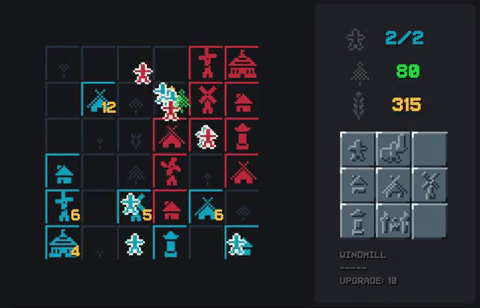Swords & Forks
The board ain’t big enough for the both of us. Construct buildings. Feed your peasants. Recruit knights, and wipe out the opponent.
I ran out of time and was unable to implement the tower, castle and the knight. Overall, with a bit more work this could turn into a brutal micro-RTS.
Instructions
- To speed up use 1,2,3,4 keys.
- Click on a building on the right and then pick a tile to place it on.
- Houses automatically create 1 peasant.
- Windmills plant wheat around itself.
- Lumberyards plant trees around itself.
- Peasants wonder around and pick up goods.
- Click on a building to upgrade it. It will perform better, and faster.
- Towers and castles don’t do anything.
- There is no way to win.
| Status | Prototype |
| Platforms | HTML5 |
| Rating | Rated 4.0 out of 5 stars (1 total ratings) |
| Author | IggyZuk |
| Genre | Strategy |
| Made with | Unity |
| Tags | Ludum Dare 42 |
| Links | Ludum Dare |

Comments
Log in with itch.io to leave a comment.
lLove the concept, and how you borrow from classic abstract games, in terms of game play and graphics. Chinese (auto)chess and go meets rts. Do you intend to finish it?
Hey thanks! I wasn't really planning on finishing it, but you've pointed out something very interesting – it's like auto-chess. That's something I wanted to work on for a while now, but I've struggled with ideas. This concept could be a great starting point actually, thanks for this!
My pleasure. Let us know what you come up with!
I'm new to game dev so i'm not sure how relevant it is, but coming from social science and data science, it reminds me of agent based / multi-agent modeling. If you're interested in modeling/designing the effect of individual behaviors on a system, you could go have a look at what academics do. There is an open source software called netlogo, for instance, that comes with a lot of basic premade examples like bird flocking, ant colony behavior, virus progagation, social cooperation, wealth inequality, or harder science models like crystalization or enzyme kinetics. The script language used is made for scientists, not devs, so its pretty easy to read and could give you ideas for game mechanics.
Ah that's very cool! I'm a big fan of systems, dynamics, and analytical complexity. While I've heard of netlogo I've not given it a proper look, it might be good to do that now. In the past I've used machinations.io to model economies, and it still amazes me how simple numbers with out any real graphics can be so captivating. Like I can spend a solid fifteen minutes just looking at numbers going up, and down. But, admittedly, systems aren't fun in their nature. We add it through the psychology of play and tension, which is whole another topic that I absolutely love. Thanks for the ideas! :)
When the game loads, you get thrown right into it and at first it looks more like you're watching someone else's game. Frankly, because there are no instructions, the player is left to guess not only the controls, but also the objective of the game. I have so far guessed that it's a bit like a semi-idle game, where you make buildings and upgrade them, while the figures on screen do rest of the work, like collecting the resources. The visual style is nice and the game runs well for a WebGL game.
If you're interested, you'd be welcome to enter our contest, the Game Development World Championship!